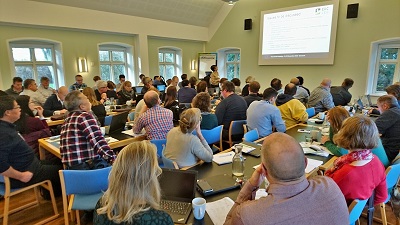EUCLEG annual meeting hosted by DLF
The strategic goal of EUCLEG is to reduce Europe and China’s dependency on protein imports by developing efficient breeding strategies for the legume crops of a major economic importance in human food and animal feed.
The objective is to improve diversification of crops, crop productivity, yield stability and protein quality of both forage (alfalfa and red clover) and grain (pea, faba bean and soybean) legumes.
EUCLEG will investigate the potential for new uses of forage species for human nutrition. Processed protein extracts have a good nutritive value for human consumption in terms of plant protein intake (amino acid composition close to that of dairy milk). It could be an alternative to meat and milk alleviating negative impacts of agriculture on the environment. Click here if you want to read more facts about EUCLEG.
The objective of the EUCLEG annual meeting, held on 21-23 November, at DLF headquarters in Store Heddinge, Denmark, was to present summaries of the first years activities in the project. The participants were partners from the several countries involved in the project and they had good and constructive discussions and workshops during the meeting.

Both Europe and China have a low level of protein autonomy. They import 30% and 60%, respectively, of the world plant protein production for both human and animal nutrition. However, in both continents, regions with appropriate agro-ecological conditions for the production of plant proteins exist. The project EUCLEG has the ambition to give a new momentum to forage and grain legume breeding. The scientific objectives of this project are to:
- broaden the genetic base of legume crops,
- analyse the genetic diversity of European and Chinese legume accessions using phenotypic traits (yield, quality in a context of climate change) and molecular markers,
- analyse the genetic architecture of key breeding traits using association genetics (GWAS) and
- evaluate the benefits brought by genomic selection (GS) to create new legume varieties.
The breeders that are members of EUCLEG will exploit the results to create the new varieties needed to improve protein production.
Visit the proejtct's website to learn much more about the project.
If you think this was interesting, you will probably like this entry regarding eating green protein in the future.


Horizon 2020 of European Union
HORIZON 2020
